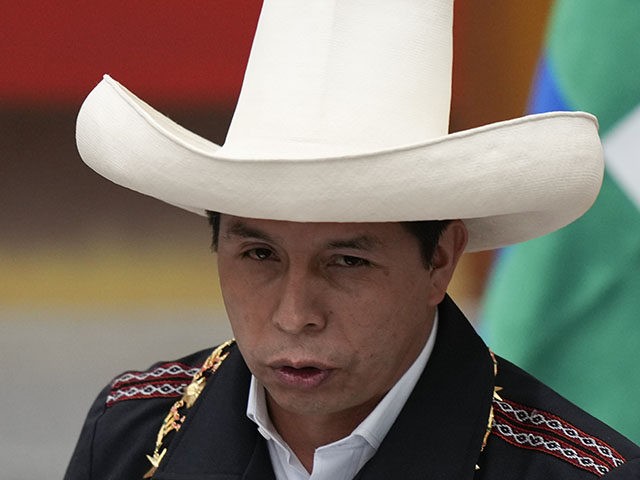A coalition of three political parties in Peru successfully collected the 26 signatures necessary to begin impeachment proceedings against communist President Pedro Castillo, attracting popular support resulting in angry citizens chasing Castillo out of a public appearance on Monday.
Congresswoman Patricia Chirinos of the center-right Advance Nation (Avanza País) party began proceedings against Castillo last week, less than six months after the presidential election that resulted in a narrow, and controversial, win for Castillo. The Advance Nation party did not offer any specifics regarding why Castillo should lose the presidency outside of the constitutional term “permanent moral disability.”
In a statement on Monday, a spokesman for the party appeared to assert that the objective of impeaching him was to improve the party’s political leverage.
“What we want is to attract the attention of the president, we have several unsuitable appointments that lead to corruption, that is one of the objectives,” spokesman José Williams said. “This is about the president coming to Congress, which is a good thing, he doesn’t come out to the media to assume his responsibilities, that is what a leader should do.”
The Peruvian newspaper Gestión noted that the parties involved need 26 signatures from lawmakers to begin the impeachment proceedings and 52 votes to make a motion to open debate on the matter. To actually remove Castillo, they would need two-thirds of Congress, or 87 lawmakers, to support it.
Advance Nation rapidly received the support of the conservative parties Popular Renewal (Renovación Popular) and Popular Force (Fuerza Popular). Fuerza Popular is notably led by Keiko Fujimori, the conservative candidate Castillo defeated to become president and daughter of former president Alberto Fujimori.
“In Popular Force, we believe that this government has been demonstrating a permanent disability to run the country. Given this, Popular Force has decided to sign the motion for presidential impeachment,” Fujimori said in a statement on Twitter last week.
Popular Force independently issued a statement through a spokesman asserting that the party was “concerned about protecting peace and economic development” in the country and called impeaching Castillo a “moral obligation.”
Castillo responded to the impeachment move on Monday by accusing those supporting it of “wanting to take the country into the abyss.”
“There are voices shouting who want to lead us to confrontation, but from our part there won’t be any,” Castillo asserted. “I call on Congress for us to organize one sole agenda, the Peru agenda. We need to work in favor of the population because they need us to rescue them … from great inequalities, from delinquency.”
Castillo is a far-left Marxist radical who belongs to an openly Leninist party known as “Free Peru.” The narrow nature of his victory against Fujimori, a hardline conservative, has left him little room to enact new policies, but he has already begun using his position to bring Peru more into the orbit of the Chinese Communist Party.
During a visit to a restaurant in Arequipa on Monday, opponents of Castillo organized outside of the location and pressuring him out, shouting “impeachment!” Castillo ultimately left the restaurant, agitating the crowd further with his presence.
Peru had three presidents in 2020 as a result of the ease with which Congress can impeachment or remove a president in the country — requiring only to debate and vote on if the president is suffering from “permanent moral disability,” for which there is no concrete definition. A president does not need to be accused of any specific crime.
In 2018, then-President Pedro Pablo Kuczynski resigned from office after Congress began impeachment proceedings against him under the moral disability clause. Kuczynski had been caught in a power struggle between his opponent in the presidential election he won, Keiko Fujimori, and brother Kenji, then a lawmaker. Under Keiko’s control, Popular Force published videos that appeared to implicate Kuczynski in bribery.
Martín Vizcarra, who became president when Kuczynski resigned as he was vice president at the time, was ousted through the morality clause in 2020. Congress attempted, but failed, to impeach Vizcarra in 2019. Lawmakers did not specify a particular incident or any evidence for their reason to remove Vizcarra.
Vizcarra’s successor Manuel Merino lasted less than a week, resigning after protests against Vizcarra’s ouster turned deadly.
Interim President Francisco Sagasti has no significant prospects to be elected in the 2021 race after his administration was caught illegally administering Chinese coronavirus vaccines to themselves before distributing them to the public.
Popular Force — one of the most longstanding conservative parties in Peru — has notably supported reforming impeachment law to prevent the constant cycle of presidential ousters. Fujimori, as a presidential candidate, supported a constitutional amendment to define “permanent moral incapacity” so that lawmakers attempting to remove the president would have to offer specific reasons why, avoiding the “constant political crises” that have defined the last decade of Peruvian politics.

COMMENTS
Please let us know if you're having issues with commenting.